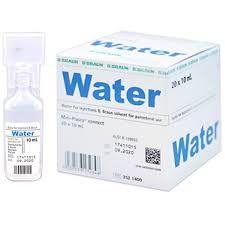Water for Injection (WFI) is a sterile, nonpyrogenic preparation of water that is used primarily as a diluent or solvent for the preparation of parenteral solutions. It is essential in medical settings for mixing with medications intended for intravenous (IV), intramuscular (IM), or subcutaneous (SC) administration.
Key Features
- Purity: WFI must meet stringent quality standards, containing no significant contaminants. It is produced through processes like distillation or reverse osmosis.
- Formulation: It is typically supplied in single-dose containers and does not contain any bacteriostatic agents, making it suitable for immediate use after preparation.
Indications
Water for Injection is indicated for:
- Dilution or Dissolving Medications: Used to prepare injectable solutions by diluting or dissolving drugs that require an aqueous vehicle.
- Fluid Administration: Can be part of fluid replacement therapy when mixed with appropriate solutes to achieve isotonicity.
Mechanism of Action
WFI acts as a solvent that allows for the safe delivery of medications directly into the bloodstream or tissues. It provides a medium for the dissolution of drugs, ensuring they can be effectively administered.
Dosage and Administration
- Recommended Use: The dosage of WFI depends on the specific medication being prepared. It should be made approximately isotonic by adding suitable solutes before injection to prevent hemolysis and other complications.
- Administration Tips:
- Use aseptic techniques when preparing solutions.
- Inspect visually for particulate matter and discoloration before administration.
Side Effects
While WFI itself does not typically cause side effects, improper use can lead to complications such as:
- Hemolysis: If injected without proper isotonic adjustment, it can cause breakdown of red blood cells.
- Fluid Overload: Excessive administration may lead to fluid overload, particularly in sensitive populations like neonates or individuals with heart conditions.
Precautions
- Contraindications: WFI should not be injected directly into the bloodstream without proper isotonic adjustment.
- Pregnancy and Breastfeeding: Generally considered safe when used appropriately, but consult a healthcare provider if there are concerns.
- Drug Interactions: Some additives may be incompatible; consult with a pharmacist when preparing solutions.

